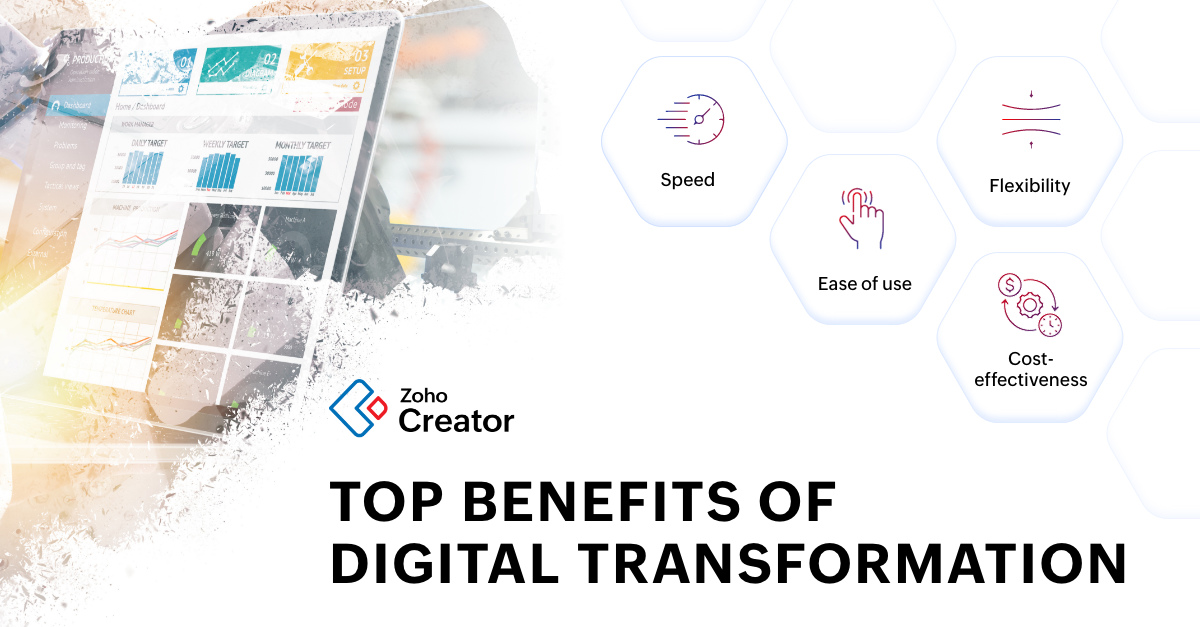- HOME
- Know Your Tech
- Top 10 benefits of Digital Transformation
Top 10 benefits of Digital Transformation
- Last Updated : June 12, 2024
- 2.1K Views
- 5 Min Read
Think of digital transformation (DX) as upgrading from a horse-drawn carriage to a Tesla—a vivid analogy for the shift that businesses are undergoing in the digital age.
Outdated technologies, processes, and difficulty connecting with customers are just a few hurdles companies face that can hinder business growth and success. In response to these challenges, businesses are turning to digital transformation as a solution. Digital transformation involves adopting new technologies and processes to streamline business operations, increase efficiency, and provide an exceptional customer experience.
The growth in the adoption and implementation of digital transformation solutions is phenomenal. According to a report by the International Data Corporation (IDC)Worldwide Digital Transformation Spending Guide, worldwide spending on digital transformation technologies is projected to reach $3.4 trillion in 2026 with a five-year compound annual growth rate (CAGR) of 16.3%. Gartner's prediction for the market size of digital transformation services in 2023 is estimated to be $500 billion. These projections indicate significant growth in the adoption and implementation of digital transformation solutions in the near future.
In this article, we'll delve into the significant benefits that digital transformation can bring to organizations. From increased efficiency and cost savings, to improved customer experiences and engagement, the advantages that define digital transformation are many. Whether you're a small business owner looking to modernize your operations or a part of a large enterprise looking to stay ahead of the curve, this guide will provide valuable insights into how digital transformation can drive your success.

Here are the top 10 benefits of digital transformation
1. Increased efficiency
One of the key business benefits of digital business transformation is increased efficiency. Digital technologies can automate and streamline business processes, reducing the time and effort required to complete tasks. This frees up employees to focus on more valuable activities.
For example, businesses can use automated workflows to streamline HR processes, such as onboarding and employee performance evaluations. This not only saves time, but also helps reduce errors and improve the overall quality of these processes.
2. Improved customer experience
Another crucial benefit of a successful digital transformation is the improved customer experience. Digital tools and platforms can enhance customer interactions, providing personalized and seamless experiences across multiple channels. By doing so, organizations can build customer loyalty, increase customer retention, and ultimately drive more sales.
An example of this is using chatbots to provide quick and efficient customer support to improve the overall customer experience.
3. Greater agility and responsiveness
Digital transformation allows businesses to quickly respond to changing market conditions, business models and customer needs. By digitizing processes and adopting agile methodologies, businesses can quickly adapt to new developments and opportunities. This agility enables businesses to be more flexible and respond to the evolving needs of their customers.
For example, businesses can use agile project management methodologies to quickly pivot their projects if they find out their customers are looking for something different.
4. Enhanced collaboration and communication
Digital tools, such as cloud-based software and video conferencing platforms, can improve communication and collaboration among team members, regardless of location. This can help organizations operate more efficiently and make faster, more informed decisions.
For example, organizations can use video conferencing platforms to bring remote teams together for regular meetings to improve collaboration and decision-making processes.
5. Increased competitiveness
By leveraging digital technologies, businesses can differentiate themselves from competitors and gain a competitive advantage in the market.
Businesses can use data analytics to understand customer behavior and preferences better, which can inform product development and marketing strategies. This can help them stay ahead of the curve and maintain a competitive edge.
6. Improved security
One of the benefits of digital transformation initiatives is improved security. Digital tools and platforms can help organizations protect their data and systems from cyber threats, reducing the risk of data breaches and other security incidents.
For instance, businesses can use cloud-based security tools to protect their systems and data from cyber attacks, ensuring the confidentiality and integrity of sensitive information like customer details.
7. Better sustainability
Digital transformation can move revenue streams also improve sustainability by reducing waste and promoting more environmentally friendly practices. By digitizing processes and reducing the need for paper and other physical materials, businesses can reduce their impact on the environment and promote sustainable practices.
For example, companies can use digital tools to make digital processes, reduce paper waste and promote paperless workflows, reducing their impact on the environment.
8. Data-driven decision-making
One of the benefits of digital transformation is improved data management. Digital technology tools and platforms can help organizations store, analyze, and utilize data more effectively, leading to better decision making and improved business outcomes.
For example, businesses can use data analytics tools to gain insights into customer behavior and preferences, which can ultimately aid marketing and sales strategies.
9. Increased accessibility
Another benefit of digital transformation is increased accessibility. Digital tools and platforms can help organizations to plan their digital business initiatives reach new audiences and provide more accessible services, regardless of their location.
For example, businesses can use cloud-based platforms to provide remote access to their systems and data, allowing employees and customers to access information and services from anywhere, at any time.
10. Faster time-to-market
A key benefit of implementing digital transformation in the business strategy of an organization is faster TTM (time-to-market). Organizations can react faster to market changes through digital transformation tools by rolling out products faster than their competition, which often results in improved market shares and increased overall revenue.
For example, organizations can predict product launch dates and take advantage of various marketing strategies, planning well ahead of time.
How can low-code platforms help accelerate digital transformation?
Digital transformation is a critical concern for today's CIOs, but the limitations of traditional solutions hinder their ability to deliver the quick and flexible outcomes the market demands. Here's where low-code application development platforms (LCAP) come into play. Low-code platforms are visual development environments that allow users to build custom applications in an agile manner without writing complex code.
These platforms provide prebuilt templates, drag-and-drop components, and integrations that can be easily assembled to create tailor-made digital solutions that suit your business.
There are several key benefits of using low-code platforms for digital transformation:
Speed: Low-code platforms can significantly accelerate the development process, allowing businesses to quickly build and deploy custom applications to support their digital transformation efforts.
Ease of use: Low-code platforms are designed to be user-friendly, with intuitive drag-and-drop interfaces that do not require specialized programming skills. This makes it easy for non-technical users to build custom solutions and empowers teams to be more self-sufficient.
Flexibility: Low-code platforms allow businesses to easily customize and adapt their applications to changing needs. This can help businesses respond quickly to new opportunities and challenges.
Cost-effectiveness: Low-code platforms can reduce the cost of digital transformation by eliminating the need for specialized programming resources. This can help businesses get more value from their IT investments.
Low-code platforms offer a powerful tool for businesses looking to accelerate their digital transformation efforts. By leveraging the speed, ease of use, flexibility, and cost-effectiveness of low-code platforms, businesses can quickly build and deploy custom solutions that support their own digital transformation strategies and goals.
If you're looking for a flexible, lightning-quick, and affordable way to drive your digital transformation efforts, you've come to the right place. Click the link below to start your digital culture journey with Zoho Creator, the digital transformation platform trusted by over 7 million users.
 Stephen
StephenStephen is a product marketer at Zoho Creator. An avid writer, he plies his trade evangelizing low-code during the day and pens songs at night. Sneakerhead and sushi enthusiast too.




